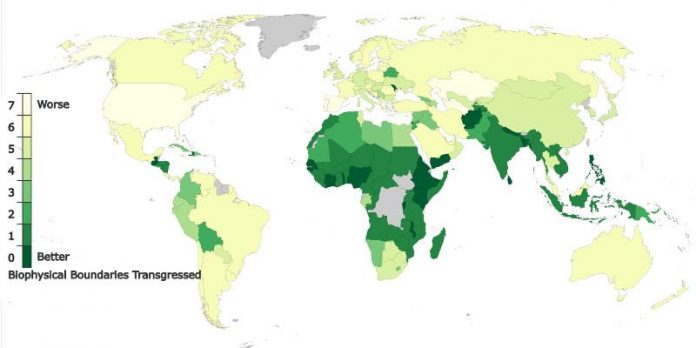A new study has found that no country currently meets its citizens’ basic needs at a globally sustainable level of resource use.
The research by the University of Leeds and published in Nature Sustainability, is the first to quantify the sustainability of national resource use associated with meeting basic human needs for 151 countries.
Each country’s resource use and well-being achievements have been made available as a website built by the academics involved in the study.
Lead author, Dr Daniel O’Neill, from the Sustainability Research Institute at Leeds, said: “Almost everything we do, from having dinner to surfing the Internet, uses resources in some way, but the connections between resource use and human well-being are not always visible to us.
“We examined international relationships between the sustainability of resource use and the achievement of social goals, and found that basic needs, such as nutrition, sanitation, and the elimination of extreme poverty, could most likely be achieved in all countries without exceeding global environmental limits.
“Unfortunately, the same is not true for other social goals that go beyond basic subsistence such as secondary education and high life satisfaction. Meeting these goals could require a level of resource use that is two to six times the sustainable level.”
Co-author, Dr Andrew Fanning, also from the Sustainability Research Institute, said: “Our results suggest that some of the United Nations Sustainable Development Goals, such as combating climate change and its impacts, could be undermined by the pursuit of other goals, particularly those focused on growth or high levels of human well-being.”
This study builds on research by the Stockholm Resilience Centre that identified nine environmental processes that regulate the planet and proposed safe “planetary boundaries” for each that — if persistently exceeded — could lead to catastrophic change. The planetary boundaries include issues such as climate change, land-use change, and freshwater use.
The researchers distributed seven planetary boundaries among nations according to their share of global population, and then compared these boundaries to national resource consumption, after correcting for international trade.
At the same time, the study scored countries on 11 social objectives established in previous research on what it would mean for countries to develop in “safe and just” way. The objectives included healthy life expectancy, access to energy, and democratic quality among others.
The study benchmarked each country’s resource use against the planetary boundaries, and mapped these alongside the social indicators. The mapping showed no country performed well on both the planetary and social thresholds.







